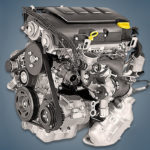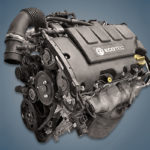The 1.8-liter Opel Z18XE or 2H9 engine was assembled at a plant in Hungary from 2000 to 2009 and installed on almost all popular mid-size models of the group of its time. This power unit was essentially a modernized version of the famous X18XE1 motor.
The Z15 family also includes engines: Z16SE, Z16XE, Z16XEP, Z16XER and Z18XER.
The engine was installed on:
- Opel Astra G (T98) in 2000 – 2005; Astra H (A04) in 2004 – 2006;
- Opel Corsa C (X01) in 2001 – 2006;
- Opel Meriva A (X03) in 2003 – 2009;
- Opel Vectra B (J96) in 2000 – 2002; Vectra C (Z02) in 2002 – 2005;
- Opel Signum A (Z03) in 2003 – 2005;
- Opel Tigra B (X04) in 2004 – 2009;
- Opel Zafira A (T98) in 2000 – 2005.
Specifications
| Production years | 2000-2009 |
| Displacement, cc | 1796 |
| Fuel system | distributed injection |
| Power output, hp | 125 |
| Torque output, Nm | 170 |
| Cylinder block | cast iron R4 |
| Block head | aluminum 16v |
| Cylinder bore, mm | 80.5 |
| Piston stroke, mm | 88.2 |
| Compression ratio | 10.5 |
| Features | VIS |
| Hydraulic lifters | yes |
| Timing drive | belt |
| Phase regulator | no |
| Turbocharging | no |
| Recommended engine oil | 5W-30 |
| Engine oil capacity, liter | 4.25 |
| Fuel type | petrol |
| Euro standards | EURO 4 |
| Fuel consumption, L/100 km (for Opel Vectra 2001) — city — highway — combined |
11.0 6.0 7.8 |
| Engine lifespan, km | ~300 000 |
| Weight, kg | 125 |
Disadvantages of the Z18XE engine
- The unit is famous for its reliability, but it has a weak point – an unreliable ECU;
- The engine control unit often fails due to overheating, and a new one is not cheap;
- The timing belt changes every 60,000 km, if you miss it, then when it breaks, the valves will bend;
- The reason for the floating engine speed is usually a dirty throttle.







It’s Gods engine, and with oil changes every 16,000 Km will last well over 300k